Kwakwani is home to more than four thousand people, and like many other communities across Guyana, it has its fair share of successes and challenges.
It sits on the Berbice River, one of the three rivers which cross Region 10, and can be accessed both by road and water. However nowadays, most persons venturing in and out of Kwakwani do so by road through Linden. Whenever the fair weather roads are in reasonable condition, it would take a maximum of two-and-a-half hours by minibus at a cost of two thousand dollars per person with a surcharge for extra luggage. The other route would be from New Amsterdam via the Berbice River, but this is now mainly used by the bauxite operations at Aroaima.
“We love this community and would do anything possible to see it grow from strength to strength,” said Jostlyn Morian, a popular person around the Kwakwani neighbourhood. With humble beginnings in the days of the Reynolds Bauxite Company in 1960, the community now comprises one of two Neighbourhood Democratic Councils.
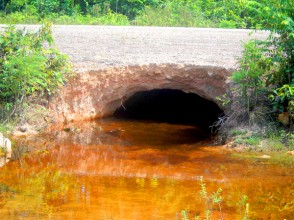
Among the many challenges alluded to above were the high cost of commodities, transportation costs, the imminent introduction of payments for electricity, poor roads and lack of access to banking institutions. The closest bank is at Linden, and in cases where emergency cash is needed, residents utilize a Republic Bank point-of-sale machine at the lone gas station.
The cost of all the utility services was previously carried by the bauxite industry, however, residents are now being prepared to foot these costs one at a time. First on the list is electricity. According to residents some time in the New Year they would be paying some $30 per kilowatt hour after a stipulated amount free across the board. A special arrangement would be in place for senior citizens. “Money aint circulatin in here and I don’t know what will happen with this new system.” commented one resident.
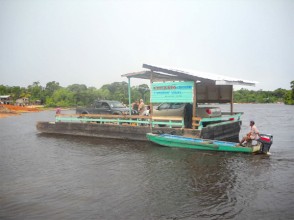
Currently residents have been given until December 15, 2010 to re-wire their properties, failing which they are likely to be disconnected. A number of houses and businesses have already had meters installed.
“Deh meters are already up and working, and when you read it and do the calculation you done know is problems for plenty people pay with dem kind of money for current,” said a resident who chose not to be named.
Another problem is the decade old Kwakwani airstrip which is on the brink of collapse; residents fear this might happen at a time when an aircraft lands there. A culvert which runs beneath a section of the airstrip has collapsed and a part has begun to fall in. The escaping water has created a large breach in the access road making it almost impassable. The inactivity of the NDC has been blamed for the neglect of the airstrip, among other community works, including the collection of garbage.
Lamp Island
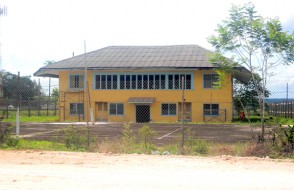
There are in excess of five sub-communities making up the NDC of Kwakwani, one of which is Lamp Island. This is a small community which is strung out along the bank of the Berbice River and is home to some twenty-five families. “We happy here man, and besides the flooding and water problem we like it here,” said community member and security supervisor attached to the bauxite company, Brian Welchman.
At the time Welchman, his wife and others were enjoying the afternoon breeze on an outdoor bench made of wattle, chatting with neighbours one of whom was ‘cooling out’ in a hammock. “Y’all leh we don’t be afraid to talk; we need some help in here,” shouted the man from the hammock.

Welchman explained that their life is a cycle which is interrupted annually when the May-June rainy season is on. “You wouldn’t believe me, you got to see for yourself when is May-June rain season. Deh water does be more than 6ft high.” It would take two to three months before the high water recedes. Thousands of dollars worth of investments in farming are usually destroyed; homes are flooded, destroying or damaging personal belongings, and access to food becomes a major challenge because the farms are usually inaccessible and fishing and hunting are interrupted. “During that time de fish don’t deh cause the water does be so high, and yuh can’t do no hunting so it does be really hard fuh we here.” said another resident.
A few men of Lamp Island are employed with the bauxite company or logging firms, while 95% of the women stay at home to care for their children.
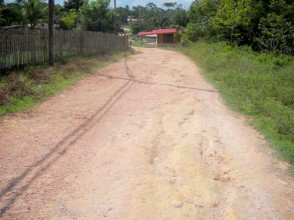
Several attempts have been made to have the residents of Lamp Island relocated to higher ground. As Stabroek News understands it a large area at Kwakwani Park was set aside for the residents, but they said they were comfortable with their current way of life for a number of reasons. “If we go out there [Kwakwani Park] we can’t farm, because people does have their cows and so all over deh place; secondly, we got to pay a set of money that we don’t have to move we houses and still pay another set a money for deh land – we can’t afford dat,” said Vivine Lindy supported by Hollyann Reece.
Residents also spoke of the absence of a potable water supply and said that over the years the only development that had taken place in Lamp Island was the construction of a fair weather road, making access to the community easier. This was done through the community service activity of the Lions Club. “If they mek deh road more betta people would start bringing in deh stuff and building up deh land and suh so we could live more comfy.”
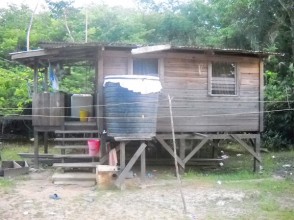
The residents did say that they were open to accessing skills training activities to aid them in becoming more resourceful.
Logging
The life of fishing and hunting is not unique to Lamp Island, and is a common source of income to the general population of Kwakwani as well. These activities take approximately one week before their catch reaches markets in Kwak-wani. However, logging is the largest economic activity there. Residents said that the logging industry at Kwakwani is experiencing major challenges, the biggest of which stems from the Guyana Forestry Commission. They claimed that in the past they “just cut wood and ship-out,” but recently the GFC has been putting pressure on them to ‘put their house in order.’
Championing the cause in putting their house in order is the Upper Berbice Forest and Agriculture Producers’ Association (UBFAPA), with approximately one hundred and seventy members. This organization headed by Pastor Cort Simeon has been diligent in its efforts to conduct logging and farming activities in a legal manner. “We are a group of people who came out of illegal logging and we formed ourselves together in 2002 and we have seen a lot of achievements since then.” said Simeon. The group said that they were working with a five-year strategic plan which would see the establishment of a processing facility should all go well by mid-2011.
It is estimated that 75% of the Kwakwani population depends on the organization, directly or indirectly. With the recent acquisition of a truck, a portable mill, a tractor and a pick-up they are hoping to attract the attention of the government and other stakeholders. “We pay back $35,000 every month to the community; we pay a volunteer teacher at the primary school; we weed the waterfront nursery yard every month… we give the under 19 basketball club $50,000 every year… and many other things we would contribute to.”
The Bauxite Company of Guyana Inc (BCGI), apart from providing employment to a fair number of residents of Kwakwani previously also contributed the monthly sum of $100,000 to the Kwakwani NDC. However, according to Jostlyn Morian this was discontinued because of mismanagement and poor accountability.
There have too been the stresses associated with the dismissal of workers by the company, an issue which has not as yet been resolved.
Despite the many challenges residents of Kwakwani are still optimistic that brighter days are just beyond the horizon, and will bring with them paved roads, a modernized market and supermarket, economic and recreational activities for residents including youths, among other things. “We are beginning to see the signs, RUSAL open up back the bauxite operations here and that’s a glare of what’s beyond the horizon for us here in Kwakwani.”
Education
and health
There is a full complement of learning institutions, including two nursery, one primary and one secondary school. Residents say that the levels of work achieved by these schools are commendable despite a shortage of teachers and modern facilities.
However, many expressed concerns about the management of the students’ hostel. They claim that sometimes the designated housemother would leave the area, and the children would be left under the watchful eyes of her husband. “I am very worried about this kind of behaviour; you cannot go away for days and leave a man to look after girls and boys, all sorts of thing does go on.” said one resident. Several others had similar concerns. Attempts to secure a comment from the education officer in the area proved futile.
Widely circulated in the community is the popular carilla wine, a product of the home economics department of the Kwakwani Secondary School. Accord-ing to one of the teachers the wine received national recognition at a food fair held some time last year. Since then the wine has become a household product. Currently the school hopes to be in a position to produce the wine on a large scale to supply markets nationally and internationally.
The inability of the Kwakwani Hospital to provide emergency care is a matter of concern to residents. They said that that while the hospital has the basic staff, including a resident doctor, medex, dentist and x-ray technician, patients are being transferred more than twice a week to the Linden Hospital Complex. Whenever there are serious cases, including accidents, persons lose their lives because of the long distance to the Linden hospital. “Sometimes we does got to get aircraft for major incidents and that is limited; what they need here is an operating theatre,” said an informed source. The area was recently provided with a new, well-equipped ambulance to facilitate faster transfers to Linden.
According to residents the government should seriously consider the installation of an operating theatre, which is likely to reduce the incidence of amputations and death. They explained that if there are accidents in the logging concessions along the Berbice River, “by the time the victims get to Kwakwani and then to Linden, they die. If we had an operating room here most of those persons could have been operated on and their lives would have been saved.”




